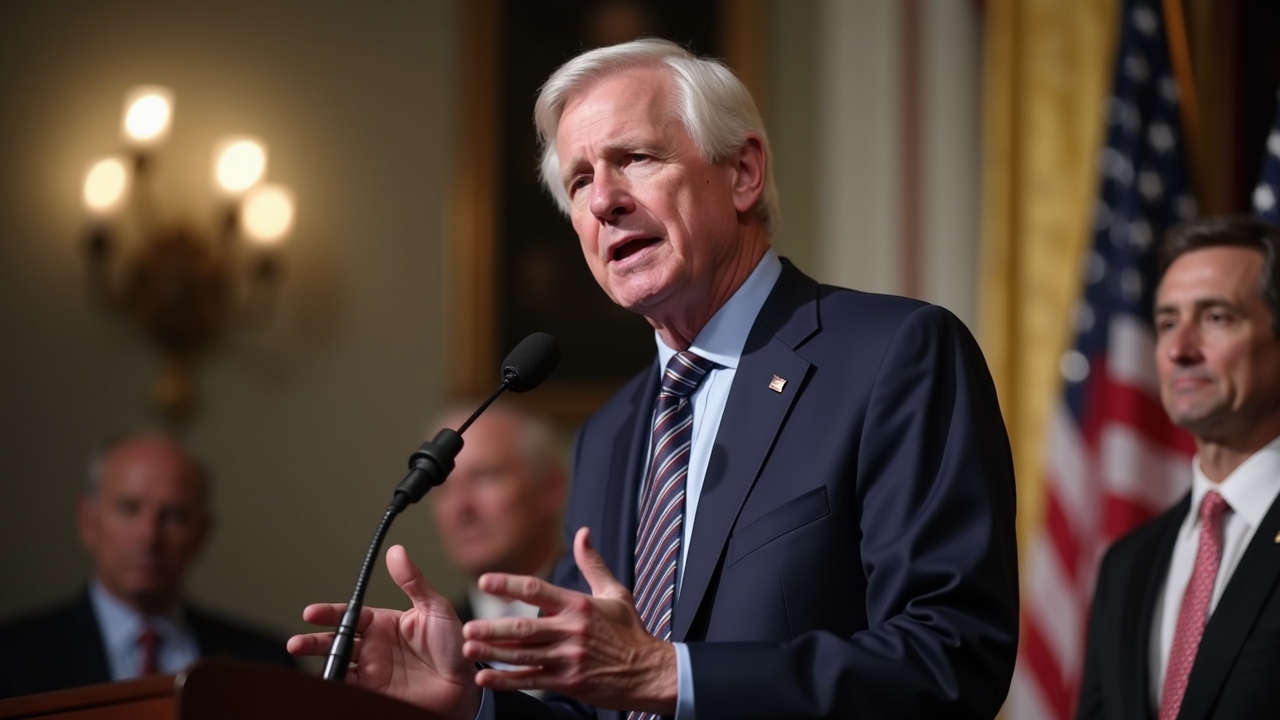PROTECT YOUR DNA WITH QUANTUM TECHNOLOGY
Orgo-Life the new way to the future Advertising by AdpathwayPolitical divisions stemming from the ongoing government shutdown are exposing serious fractures within the Democratic Party. As scrutiny from the public intensifies, officials feel pressure to address the looming threat to food security for millions of Americans.
House Speaker Mike Johnson addressed the tensions among Senate Democrats, highlighting the growing dissatisfaction and urgency voiced by the public. “They are very upset. The tension is rising,” Johnson stated, pointing out Senator John Fetterman’s recent remarks. Fetterman accused his party of risking the well-being of 42 million Americans by engaging in dangerous political posturing. “He’s right,” Johnson added.
The core of the disagreement centers around SNAP benefits, which are set to expire on November 1 due to the prolonged shutdown. SNAP serves approximately 42 million Americans and is vital for many households with children, elderly, and disabled members. The Senate has failed thirteen times to pass a clean continuing resolution (CR) that would reopen the government.
Senate Democrats are insisting that any funding deal also include an expansion of Affordable Care Act subsidies, which they argue is necessary for supporting around 22 million Americans, including undocumented immigrants. However, prioritizing these health care expansions has delayed critical food assistance, forcing struggling families to prepare for the impending SNAP cutoff.
Fetterman took a bold stance last week, cautioning his colleagues against what he viewed as reckless brinkmanship. “If SNAP goes down, it’s not going to be a red or blue state tragedy — it’s just going to be a tragedy,” he declared on the Senate floor, reminding his peers of the looming crisis that could see over 40 million individuals losing access to food assistance. “We cannot allow that,” he insisted.
Speaker Johnson’s comments resonate with a diverse coalition of stakeholders urging Senate Democrats to set aside political leverage in favor of a clean CR. “You’ve got labor unions, the largest airlines in America, independent voters. Working-class Americans across the country,” Johnson noted, emphasizing their call for action to “stop using the people’s hardships for the Democrats’ political games.”
Republicans in both the House and Senate have expressed their willingness to pass a clean CR immediately, devoid of any attached policy conditions. Some GOP senators, including Josh Hawley, Lisa Murkowski, and Susan Collins, have backed legislation aimed at retroactively funding SNAP benefits if Democrats resist approving a broader deal.
Senator Hawley introduced the Keep SNAP Funded Act last week, gathering support from ten Republican senators. “I think we got to find some way to get help to 40 million people. This Saturday is going to be bad. It’s going to be really bad,” he remarked, stressing the urgent need for action.
Senator Murkowski highlighted the risks faced by remote communities in Alaska, where many residents rely heavily on SNAP benefits. “In many of these smaller villages — some that only have a single store — 60 percent or more of the residents are SNAP beneficiaries. The impact of a lapse in benefits is not negligible,” she said, underscoring the gravity of the situation.
Yet, despite concerns from both sides of the aisle, Senate Democratic leadership, led by Majority Leader Chuck Schumer, remains firm in their stance for comprehensive funding that includes expanded health care provisions. This approach has drawn sharp criticism, including from within the party itself. One anonymous Republican senator condemned Schumer’s tactics, noting that they were endangering “young mothers who can’t feed their children.” The lawmaker lamented the use of vulnerable populations as bargaining chips in a political game.
The lack of SNAP funding during the shutdown poses a significant economic threat, with roughly $8 billion injected into the economy each month through grocery purchases and supply chain demands. The halt in benefits not only endangers recipients but could also harm local food retailers and suppliers, particularly in rural areas where such revenue is crucial.
Currently, the average SNAP household receives just over $347 a month, often determining whether families can maintain stable nutrition. Food banks report increased demand as families brace for the possible disruption in benefits.
Public criticism of Democratic leadership is growing louder. Recently, the International Association of Machinists and Aerospace Workers joined calls for Congress to “end the political games” and “put workers and families first.” Additionally, over 20 airline and logistics CEOs signed a joint letter expressing their concerns regarding federal labor furloughs and the SNAP freeze, warning of negative impacts on the nation’s economic recovery.
Despite this mounting frustration, Senate Democrats have continued to block votes on clean CR measures. Senate Minority Whip John Thune expressed disappointment after the latest failed vote, stating, “We are 29 days into a Democrat shutdown… SNAP recipients shouldn’t go without food.” His comments reflect the real-life consequences of the ongoing impasse.
Republican leadership remains divided on whether to implement individual funding measures or focus on securing a full government reopening through a comprehensive CR. Some argue that passing smaller, targeted fixes would relieve pressure on Senate Democrats, while others advocate for a broader strategy to expedite the resolution of the shutdown.
As Johnson’s warnings point to growing tensions within the Democratic Party, the political dynamics in Congress are shifting. With Fetterman’s criticisms now public and reports of dissatisfaction rising among Democrats, the costs of prolonged delays could soon change the internal calculus regarding the shutdown.
As it stands, the deadlock persists, with the fate of food benefits for tens of millions of Americans hanging in limbo. Both sides of the aisle face questions from constituents as they watch Washington struggle to fulfill its basic duties.
"*" indicates required fields


 21 hours ago
5
21 hours ago
5


















.jpg)






 English (US) ·
English (US) ·  French (CA) ·
French (CA) ·